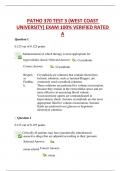Patho 370 test 3 Study guides, Class notes & Summaries
Looking for the best study guides, study notes and summaries about Patho 370 test 3? On this page you'll find 54 study documents about Patho 370 test 3.
Page 3 out of 54 results
Sort by
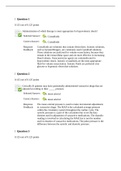
-
PATHO 370 Test 3 complete exam questions and answers (graded A) latest docs
- Exam (elaborations) • 18 pages • 2021
- Available in package deal
-
- $11.49
- 1x sold
- + learn more
PATHO 370 Test 3 complete exam questions and answers (graded A) latest docs
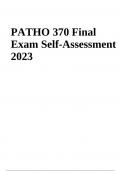
-
PATHO 370 Final Exam Questions With Correct Answers Latest Updated 2024 (GRADED)
- Exam (elaborations) • 60 pages • 2024
-
- $18.49
- + learn more
PATHO 370 Final Exam Questions With Correct Answers Latest Updated 2024 (GRADED) Amanda is measuring the temperature. She looks at the thermometer and sees that it is somewhere between 65 and 66 degrees Fahrenheit. She is okay with the temperature in between two integers because she knows temperature is not ________ data, but temperature is _________ data. a) Nominal, Ordinal b) Nominal, Discrete c) Continuous, Discrete d) Discrete, Continuous Feedback: The correct answer ...
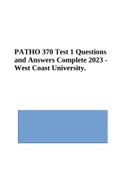
-
PATHO 370 Test 1 Questions and Answers Complete 2023 - West Coast University
- Exam (elaborations) • 32 pages • 2023
- Available in package deal
-
- $15.49
- + learn more
PATHO 370 Test 1 Questions and Answers Complete 2023 - West Coast University. All the following stress-induced hormones increase blood glucose except Selected Answer: c. aldosterone. Correct Answer: c. aldosterone. Response Feedback: Aldosterone results in water and sodium retention and potassium loss in the urine. It does not affect blood glucose. Cortisol is a glucocorticoid secreted by the adrenal cortex. Cortisol stimulates gluconeogenesis in the liver, thus increasing blood glucose....
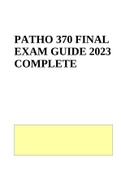
-
PATHO 370 FINAL EXAM GUIDE 2023 COMPLETE
- Exam (elaborations) • 13 pages • 2023
- Available in package deal
-
- $13.49
- + learn more
PATHO 370 FINAL EXAM GUIDE 2023 COMPLETE. Manifestations from sodium imbalances occur primarily as a result of cellular fluid shifts. 8.The consequence of an upper urinary tract obstruction in a single ureter is hydronephrosis. 9.Accumulation of fluid in the pleural space is called pleural effusion. 10.A patient presenting with a severe, pounding headache accompanied by nausea and photophobia is likely experiencing a ________ headache. migraine 11.Which dysrhythmia is thought to be associat...
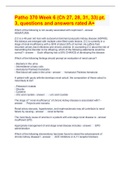
-
Patho 370 Week 6 (Ch 27, 28, 31, 33) pt. 3, questions and answers rated A+
- Exam (elaborations) • 6 pages • 2023
- Available in package deal
-
- $15.49
- + learn more
Patho 370 Week 6 (Ch 27, 28, 31, 33) pt. 3, questions and answers rated A+ Which of the following is not usually associated with nephrosis? HEMATURIA Z.C is a 49 year old man with autosomal dominant polycystic kidney disease (ADPKD). His kidneys are enlarged with multiple urine filled cystic lesions. Z.C is currently in a stage of renal insufficiency with a GFR of about 20% of normal. He suffers from recurrent urinary tract infections and chronic anemia. In counseling Z.C about the risk...
PATHO 370 TEST 3 (WEST COAST UNIVERSITY) EXAM 100% VERIFIED RATED A
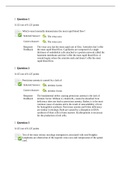
-
Patho 370 Test 2:DB
- Exam (elaborations) • 32 pages • 2021
-
- $11.69
- 2x sold
- + learn more
Patho 370 Test 2:DB - Pernicious anemia is caused by a lack of Selected Answer: b. intrinsic factor. Correct Answer: b. intrinsic factor. Response Feedback: The fundamental defect causing pernicious anemia is the lack of intrinsic factor. Without it, vitamin B12 cannot be absorbed. Iron deficiency does not lead to pernicious anemia. Rather, it is the most common cause of anemia and is the result of unavailability of iron for hemoglobin synthesis. Pernicious anemia and folate deficiency ...
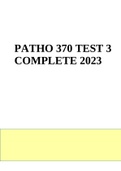
-
PATHO 370 TEST 3 COMPLETE 2023
- Exam (elaborations) • 19 pages • 2023
-
- $17.49
- + learn more
PATHO 370 TEST 3 COMPLETE 2023. A patient with significant aortic stenosis is likely to experience Selected Answer: b. syncope. Correct Answer: b. syncope. Response Feedback: In the patient with aortic stenosis, syncope and “greying out” episodes may occur when cerebral perfusion is inadequate. Low systolic blood pressure is a common sign of aortic stenosis. Faint pulses are a common sign of aortic stenosis. Peripheral edema is not associated with aortic stenosis. Question 5 0...
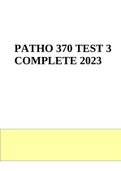
-
PATHO 370 TEST 3 COMPLETE 2023
- Exam (elaborations) • 19 pages • 2023
- Available in package deal
-
- $13.49
- + learn more
PATHO 370 TEST 3 COMPLETE 2023. Administration of which therapy is most appropriate for hypovolemic shock? Selected Answer: c. Crystalloids Correct Answer: c. Crystalloids Response Feedback: Crystalloids are solutions that contain electrolytes. Isotonic solutions, such as lactated Ringers, are commonly used crystalloid solutions. These solutions are preferred for volume resuscitation, because they remain in the extracellular space and are more effective in increasing blood volume. Vasoc...
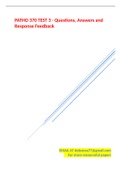
-
PATHO 370 TEST 3 - Questions, Answers and Response Feedback
- Exam (elaborations) • 19 pages • 2023
- Available in package deal
-
- $14.99
- + learn more
Question 1 0.125 out of 0.125 points Administration of which therapy is most appropriate for hypovolemic shock? Selected Answer: c. Crystalloids Correct Answer: c. Crystalloids Response Feedback: Crystalloids are solutions that contain electrolytes. Isotonic solutions, such as lactated Ringers, are commonly used crystalloid solutions. These solutions are preferred for volume resuscitation, because they remain in the extracellular space and are more effective in increasing blo...

How did he do that? By selling his study resources on Stuvia. Try it yourself! Discover all about earning on Stuvia



